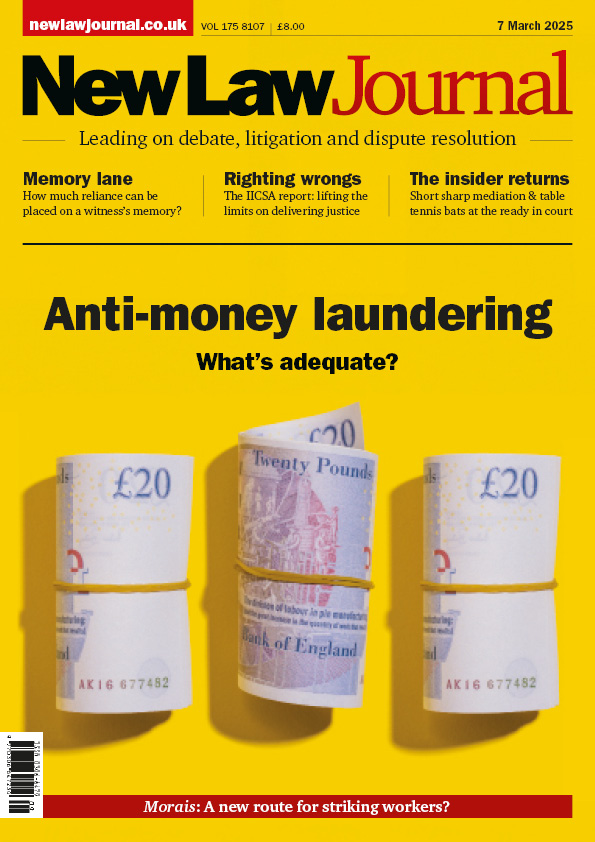THIS ISSUE

A dispute between Ryanair and hundreds of its pilots could bring about a new route for trade union detriment claims, writes Charles Pigott, professional support lawyer, Mills & Reeve, in this week’s NLJ.
The decision to remove the three-year primary limitation period for claims arising from child sexual abuse has been welcomed by abuse survivors, Richard Scorer, head of abuse law and public inquiries at Slater & Gordon, writes in this week’s NLJ.
Bats in court? It can only be the latest report from The Insider, AKA NLJ columnist Professor Dominic Regan of City Law School.
Memory is fallible, so how should litigation lawyers be aware of this when preparing witness statements? Mary Young, partner, and Laurence Clarke, senior associate, in the dispute resolution team at Kingsley Napley, discuss the unreliability of memory and court procedure rules introduced nearly four years ago on record-keeping and preparation of witness statements.
The UK government has the power to review and potentially stop any business transactions that could threaten national security, courtesy of legislation that came into effect at the start of 2022. In this week’s NLJ, Ludovica Pizzetti, counsel, Arnold & Porter, looks at the operation to date of this legislation, the UK National Investment and Security Act 2021 (NSIA 2021).
Is the anti-money laundering regime too vague? In this week’s NLJ, Jonathan Fisher KC, Red Lion Chambers, looks at two recent cases involving solicitors where the standards applied were assessed according to whether they were ‘adequate’ or ‘appropriate’.
This month, Dominic Regan covers leapfrog appeals, ‘short sharp mediation’, the role of juniors & table tennis bats in court
Righting wrongs: Richard Scorer welcomes the removal of time limits on civil claims for child sexual abuse
How much reliance can be placed on a witness’s memory? Mary Young & Laurence Clarke consider the challenges of determining truth & credibility in evidence
The definition of ‘property’ is about to expand: Jessica Boxford, Joseph Evans & Cassidy Fan explore the impact on insolvency practitioners
MOVERS & SHAKERS

Keystone Law—Milena Szuniewicz-Wenzel & Ian Hopkinson
International arbitration team strengthened by double partner hire

Coodes Solicitors—Pam Johns, Rachel Pearce & Bradley Kaine
Firm celebrates trio holding senior regional law society and junior lawyers division roles

Michelman Robinson—Sukhi Kaler
Partner joins commercial and business litigation team in London
NEWS
The government has pledged to ‘move fast’ to protect children from harm caused by artificial intelligence (AI) chatbots, and could impose limits on social media as early as the summer
All eyes will be on the Court of Appeal (or its YouTube livestream) next week as it sits to consider the controversial Mazur judgment
An NHS Foundation Trust breached a consultant’s contract by delegating an investigation into his knowledge of nurse Lucy Letby’s case
Draft guidance for schools on how to support gender-questioning pupils provides ‘more clarity’, but headteachers may still need legal advice, an education lawyer has said
Litigation funder Innsworth Capital, which funded behemoth opt-out action Merricks v Mastercard, can bring a judicial review, the High Court ruled last week







